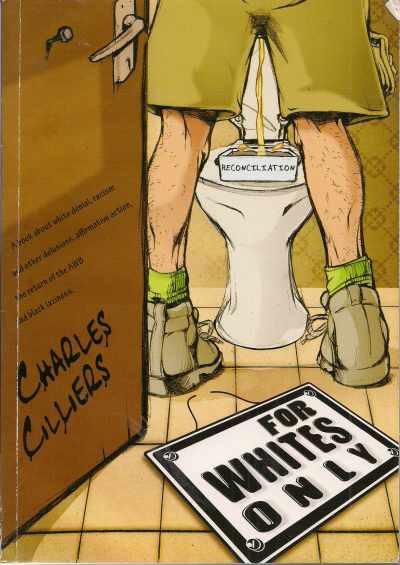Brene Brown, a social worker/researcher, presented her
findings as a TED Talk a couple years ago.
She began by trying to understand shame.
This preliminary question led her to life changing research about the
nature of our vulnerability. Brown says
that shame is caused by the fear of not being accepted. We all yearn to feel belonging.
Therefore, we create groups, microcosms based upon common
characteristics. By defining ourselves
in certain ways, inherently the “other” is created. That is the first step to stereotyping and
discrimination. We can create clubs
based on income, interests, shared experiences, etc. But the most common groups are created based
on the most obvious differences between us: physical characteristics. Race.
In the Peace Corps office, we have a whole shelf of old
books volunteers leave when they return to the states. There are enough books to keep all of us busy
reading for months. On my last trip
there, I picked up a book called “For Whites Only” by Charles Cilliers. It looked thought provoking (see cover below)
so I took it. I have about 10 books
sitting in stacks in my house, but I decided to read this one. Boy, I am glad I did.
The book is about race in South Africa (see my first post
about this here). Cilliers is a white
South African. He wrote the book for
other white South Africans, to make “us more open and willing to learn, as well
as appreciative of the many white people who took a stand against apartheid and
racism and helped to pave the way to democracy.” I am not quite done with it, but will still
wholeheartedly recommend it for ANYONE to read—any race, any nationality. I read it particularly to draw parallels with
race relations in America.
Lately, I have found myself comparing Americans and
Batswana—not in a judgmental way per se, but more to just process the views
engrained in me as part of my culture.
But I began to wonder if I was generalizing too much, lumping all
Americans into my America as a white, middle-class female. That being said, I grew up going to inner
city Providence all the time. My dad
worked at a high school there. My mom
tried to open up a multicultural center while serving as an AmeriCorps
volunteer in the south right after the assassination of Martin Luther King,
Jr. Needless to say, my parents were
always inclusive of everyone. I was
never raised with any notion to think of someone differently because of the
color of their skin. But I still lived
in a predominantly white area and attended predominantly white schools. I cannot deny that being Caucasian is part of
my identity. Regardless of how we define
ourselves—by the color of our skin or not—the world has a tendency to do so
anyway.
You will oftentimes hear volunteers here say, “Batswana are
like this….Batswana are like that.”
There are lazy people here for sure.
There are also incredibly hardworking people. Same as in the states. One thing Cillier’s book challenges is that
race has anything to do with laziness/ambition/kindness etc. If I grew up in Botswana, white or not, I would
be a Motswana woman and view the world as they do. Europeans were not inherently smarter or more
progressive than Africans. They just grew
up in different environment, especially in terms of the availability of land,
and were shaped differently.
Most Batswana are Christians, owing to the influence of
European missionaries in the 1800s.
Traditional healers do exist, but they are much less common than before
the European influence. I have had many
locals tell me that, for a while, Batswana accepted anything
Europeans/Americans said because, “since it came from the white man, it had to
be better.” Luckily, that is
changing. But it is a past that I am
conscious of. I know that Peace Corps is
different. I know that Peace Corps
volunteers are not just white. We have
volunteers that comprise all races, sexualities and backgrounds. I also know that we are here to help the
communities do things themselves. But I
was still slightly uncomfortable with the “photo op” of the white woman helping
all of the poor, African children. It is
a theme we see time and time again in the news, cinema…everywhere. The well-off, middle-class, white person goes
in the hood and inspires all of the black thugs. It is a motif I strongly dislike.
So where do I fit into it?
“For Whites Only” made me realize something truly beautiful. The world may define me as a single, white
female, but that doesn’t mean I must do the same. I want to help those who need it—regardless
of race. And if that is in the black
community in the United States, so be it.
If it is in white suburbia, so be it.
I don’t need to define myself based on the color of my skin. Obviously it is part of me and has helped to
shape who I am but not any more than all the other events and experiences in my
upbringing.
I can define myself as white. American. Woman. Westerner.
Rhode Islander. But I can also say that
I love music, I love to dance, I love to swim, I love to read. And then how different am I from Batswana? I want to stop looking at the differences and
start looking at the similarities. There
is a lot more that unites us than divides us.
We have the most important thing in common. We’re human.

No comments:
Post a Comment